The Rule of Emotions Over the Lives of Certain Christians-STAR-89
The Rule of Emotions Over the Lives of Certain Christians--STAR-89
Part-1–The Rule of Emotions Over the Lives of Certain Christians
In following up with my last Sabbath Thoughts and Reflections post (episode 88—”When Tradition Overrides Truth and Reason”), I explored how some of the traditions of the church (namely the modern Southern Baptist Church) seemed to override and supersede many biblical truths and in some cases even commonsense and spiritual reasoning. I reflected upon the things that I had witnessed that transpired in and around the passing of one of my close, dear family members and how many of the traditions and practices of the Baptist Church related to the passing of members of the Baptist Community are not in any way biblically-based and that some of those things defied what I would say is general reasoning. These things—these traditions and practices–are part and parcel of my upbringing in the Baptist Church of my youth and at the time of my upbringing, I of course, bought into all of these traditions and practices lock-stock-and barrel without question. Why would one question such sketchy traditions and practices when members of the Baptist Community have been taught from birth to not question the ways and things of the Church because those ways and things were biblical and had always been. Questioning the traditions and practices of the Church was tantamount to questioning God Himself, and everyone knows that one does not question God—for the Church and God are essentially one and both are sovereign and authoritative.
In many parts of this community, the pastors, ministers, evangelists, and teachers of the church are believed to hear directly from God and Jesus Christ and what they say and do is relatively infallible. Thus those anti-biblical traditions and practices remain entrenched in the fabric of the Baptist Church Community to this day.
I must mention one thing that I did witness throughout the course of this journey of mine related to the Baptist Community: there are a small handful of members of this community that are becoming more and more emboldened to question many of those established practices and traditions. This I found to be a relatively positive thing, for when one is able to move beyond the fear of questioning why he or she do the things he or she does or believe the things that are taught in one’s chosen Faith they’ve taken the first step in establishing their journey on the path towards finding Truth—that is, if finding Truth is important to that individual. Indeed, I have come across many folks during my stay here who are in absolutely no rush to find Truth, or for that matter, to establish a true and substantive relationship with the Creator of the Universe. For these individuals, it is more important to maintain traditions, practices and culture than to find and live out Truth and have a personal relationship with the Almighty. Nevertheless, I am encouraged that there appears to be that remnant that is actually reading their bibles and who are beginning to perceive that the things that they once held as sacred in the Church may not be as sacred as they’d always been taught or have believed them to be.
In my reflections on some of the traditions of the Baptist Church of my youth (mainly centered around death and eternal life), I touched upon how some of these traditions and practices that I observed seemed to target the emotions of the members of Baptist Faith Community. I found this focus and targeting of emotions to be such a powerful and prominent thing that I have been led to reflect upon it in this episode of Sabbath Thoughts and Reflections. It is clear to me, dear Saints of the Most High, that human emotions have such massive potential to be exploited by people and things that may be good and holy and beneficial, just as they can be exploited by people and things that are bad, evil and damaging to us.
Clearly, the enemy from the very beginning identified the power that emotions can and do have over us as human beings. This is of course not to say that emotions are a bad thing: on the contrary, I believe that our emotions were implanted in us by our Creator and they were given to us for purposes that would glorify and honor Yahweh/Yahovah/Yahuah—as strange as that may seem.
Part-2–Just What Are Emotions Anyway?
Google defines emotions as that of “a natural instinctive state of mind deriving from one’s circumstances, mood, or relationships with others.” They are described as feelings and sentiments. They are instinctive and intuitive and are separate from reasoning and knowledge.
In episode 88 of this program I mentioned that traditions and many of the practices of the Baptist Church played heavily upon the emotions of the members of the community, which I believe in great part has blinded the members from Truth and distracted them from sound reasoning. Now, this reality does not only apply to the Baptist Church; it applies to any denomination, faith or religion in existence today. The difference between them, us and the world is that Abba’s grace was extended to us such that we received the True Gospel and committed to walk according to the covenant and provisions set forth in His Torah.
So it’s not that these well meaning, precious believers in Jesus Christ are bad people; on the contrary, they are simply blinded to the Truth and it will take an outright act of Yahovah to loosen the scales from their eyes just as happened to Shaul (i.e., Paul) on that Damascus road shortly after the ascension of our beloved Master (i.e., reference Acts 9).
But back to emotions. The definition contends that emotions are natural and instinctive feelings and sentiments that are derived from one’s circumstances, moods and relationships with others. The traditions and practices of churchianity certainly attach themselves to members’ emotions and they work effectively to keep members of the denominational community in spiritual bondage.
Question: Why do so many people in this community go to church every Sunday? What are they looking for?
Well, there are a number of reasons why members of this community go to church each week, but the primary reasons I believe are to get an emotional fix for the week ahead and get an emotional release from past, present and perceived future challenges and problems. They want to feel better about themselves and their life’s situations. So they want their souls to be stirred and their fears allayed. Mind you, there is no obvious stated desire to learn the ways of their Creator. It’s all about having their emotions tickled and manipulated and I would submit that many of these folks are addicted to having their emotions tickled and manipulated. Thus, the point of attending church each week is all about them as individual members of their Faith Community and God is relegated to a secondary and even a tertiary place in the reasoning matrix of their minds and souls.
The other primary reason why these individuals attend church each week is because the local culture requires it. Many individuals attend churches down here each week because that is what you do every first-day of the week—you go to church—it’s the proper thing to do. Again, God is found nowhere in their decision-making matrix for attending.
Now, I came across a few lists of emotions on the internet and most of the listed emotions are pretty obvious. There seems to be three-general lists that are regarded in the realm of psychology: “Plutchik’s Wheel of Emotions;” “Aristotle’s Rhetoric;” and Darwin’s, “The Expressions of the Emotions in Man and Animals.” Many of the individual emotions found on these three-lists are repeated on these respective lists. I will not burden you by mentioning and exploring all of the emotions from these three-lists, but I would like to explore just two of these emotions that denominational churchianity seems to target most. Unfortunately the fallout from the exploitation of these emotions sadly impedes the True Gospel message from reaching the ears of the members of the Church Community.
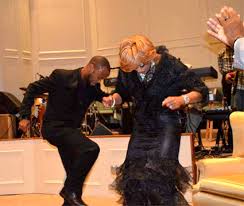
Part-3–Joy—The Fun Emotion—Right
The first emotion that I’ve seen exploited is “joy.” Certain church traditions and practices target the members’ desire to feel better about their present life situation. Thus the preaching and singing is fashioned to incite joy in the members.
I came across 155-verses in the KJV (i.e., King James Version) where joy is mentioned.
Joy denotes “gladness,” “exaltation,” and “rejoicing.” And if you’ve never had the experience of attending charismatic Christian denomination services, you’ve missed something that is distinctively American and generally of African American origin. Joy, exaltation and rejoicing is part-and-parcel of charismatic church services. There is customarily a feeling of exuberance and happiness that spreads throughout the congregation like a wildfire as a result of the heart-pounding, soul-stirring music and forceful preaching that is expertly dispensed by some very talented and motivated individuals.
Clearly, joy is a welcomed and revered emotion in this setting. The healthy-minded individual would prefer to be joyful than sad, grief-stricken or in despair. Thus the leaders of denominational churchianity realize this and they seize upon every opportunity during such church gatherings to elicit joy from their members for various and sundry reasons to include dropping a few more dollars into the offering plates. The methods employed by the singers and preachers to bring about joy among members of their congregations are generally centered around well-crafted promises to members that everything in their members’ lives is going to be alright—one way or another—and that there is coming a day when they will live out eternity in the happiest place in existence—heaven. The problem with this situation is that 9-times out of 10, the story lines that are being put forth to these members as a means to elicit joy, are not based on biblical Truths and or sound reason. Promises that members are going to heaven and that things are going to be alright in the morning, regardless how bad those things might be at the moment; regardless the lawlessness that reigns in the members’ lives; regardless the lack of obedience to Yahovah’s instructions defy commonsense and established biblical principles.
I guess it is preferable to hear about happy and fun things than to hear of stark truths that require us to conform to Father’s instructions and not our own. The joy that comes from true service to Father lasts throughout one’s earthly life—as opposed to joy that is based upon lies and misinterpretations.
Although joy is not mentioned in Torah, joy is mentioned throughout the remainder of the Tanakh (i.e., the Old Testament) and the writers firmly suggests that true joy is had by the people of Yahuah who focus their attention upon Father. In other words, joy that is centered on the individual and what that individual is going to get from God is not of Abba, but biblically-based joy is focused on Yahuah our Elohim exclusively and it is that exclusive focus on the Creator of the Universe that pays dividends to the worshiper whereby they receive a happiness and joy that the world can not fully and truly comprehend.
For us Spirit-Filled Torah Observant Believers in Yeshua Messiah, obedience to Abba’s way of life as stipulated in His perfect Torah, brings about a joy that is indescribable—certainly contrary to the understanding of the secular world and denominational churchianity. These entities see any adherence to Torah as bondage and legalistic drudgery. But the truth of the matter is that observance and obedience to Torah—Torah observance from the heart that is done by the Believer in Yeshua because he or she truly loves the Father and wants to please Him at every opportunity—brings about true everlasting joy. Reliance upon the protection, provision and spiritual guidance of Yahuah our Elohim brings about joy. Knowing that we are Abbah’s chosen and that we have a special purpose in His plan for mankind brings about joy. Our joy is not born on lies and scriptural misinterpretations.
Just a simple perusal of the 155 or so verses where joy is found in the Holy Writ strongly suggests that joy—true joy—comes from Yahweh, our Elohim. True joy does not come from man nor does it come from convenient man-centered circumstances such as stirring Church services. That joy is fleeting at best and is easily diminished and even destroyed once reality kicks in.
As it relates to our responsibility in this joy thing, it certainly does not fall upon a reliance of man to bring us joy. Instead, the Prophet Habakkuk, suggests that we rejoice and find joy in the God of our salivation (Habakkuk 3:18). Furthermore, one’s joy should not be contingent upon the preaching and singing of the Church, but instead, it must flow from Yahuah our Elohim to us and from us outward to Yahuah. Shaul (i.e., Paul) wrote that we should rejoice in Yahovah always (reference Philippians 4:4), regardless what is going on in our lives at any given time. This is certainly not an easy thing to do and it stands to reason why so many Christians default and turn to the Church to find joy. We humans love to take paths of least resistance don’t we?
I am working each day to be joyful in the things of Yahuah and my Master. It is that joy that we have within us through our obedience and relationship with the Most High that wins the spiritual battles that each of us must fight in each day.
Part-4–Fear—The Darkest Emotion
The fact that joy and other emotions are not given much parchment space in Torah tells me that being a Spirit Filled Torah Observant Believer in Yeshua Messiah is not—should not—be influenced by his or her emotions. Emotions when they are activated have a tendency to turn one’s focus to self and away from the Almighty and that just doesn’t end well for anybody now does it? No it does not.
That’s not to say that we, then, exist as lifeless, one-dimensional creatures that portray our beloved Faith as appealing as a root-canal to the outside world. The joy that we naturally receive from honoring and pleasing Abba will sufficiently fuel the essential Gospel message to an evil, dying world, to turn from lawlessness to Yahovah’s way of life and to lean not to the Church’s understanding.
The second emotion that comes readily to mind when we speak of the Church along with her traditions and practices and the influence that they have over the emotions of her members and the community is fear.
I would venture to guess that fear has probably been the most exploited of emotions in all of Church history. The one thing that generally incites fear in members of the Church is the tradition and doctrine of heaven and hell—that is, if you are saved, you go to heaven; if you are not saved, you burn for an eternity in hell. No one wants to spend an eternity burning in the fires of hell, especially if you’ve been taught since birth these traditions and doctrines. Using such erroneous teachings by leaders of the Church that are devoid of any Biblical support, is tantamount to witchcraft. It is essentially a ploy to control the members of the Church Community and Master taught against that.
Fear of eternal damnation then becomes a powerful motivator for the members of the community to “straighten up and fly right;” and it doesn’t hurt the Church’s bottom line either as people will give a little more to the organization to ensure that their fears of going straight to hell are allayed. It then becomes a practice of buying one’s salvation from the Church.
Back in the day, the Universal Church (i.e., the Catholic Church) used fear of being excommunicated from the Church or denying certain individuals communion to keep the people in check.
There are some 395-verses in the KJV where the term fear is mentioned in one form or another. In some instances, fear is used to denote a concern that something or someone is a threat to one’s wellbeing. In other instances, fear is used to denote more of a reverence and high regard for our God or some individual of influence and power.
The common theme that plays out throughout most of the Bible is one of not exercising fear of men or things from the perspective that one has concern for his or her wellbeing. Scripture teaches that our God will protect, provide and rescue us from any potential problems we may encounter in life. This of course requires that the individual in question is obedient to Yahuah our Elohim and that he or she is completely reliant and subservient to Him and Him alone.
The second part of the biblical concept of fear has to do with reverence and high regard for our God and it is Him that we are to honor and fear in like manner.
Yet the Church Triumphant, instead of training and teaching her parishioners how to fear God through Torah observance, chooses to teach her people to fear what will happen to them if they don’t say a sinner’s pray; join the rolls of the Church; give offerings and tithes; and attend Church every Sunday. Father has stipulated in the tenets of His perfect Torah how He wishes to be treated as our Sovereign. Man has chosen to step in and usurp the authority of Scripture and tell man what and how they are to fear both man and our God.
In the 25th chapter of Leviticus, Father instructs us to treat one another fairly, according to the provisions set forth in His Torah, such that no individual should ever fear harm from another. The only Being to be feared, more so from a reverence standpoint, but also from the standpoint of being concerned that we might cross Him by violating His Torah is Yah. There are instances strewn throughout Torah where Abba instructed us not to fear the enemy but instead rely upon His strong arm to protect and deliver (cf. Deuteronomy 1:21 and others). We see an example in Torah where the nations once feared us because of our God (Numbers and Deuteronomy). Further along in the Book of Revelation we see that two mighty men of Yahuah will bring the fear of God back to the nations of this earth (Revelations 11:11).
Bottom line: fear has a proper place in the lives of God’s people and it is not up to man to exploit this essential emotion for purposes of furthering the ambitions of the Church. If anyone should be fearful it is those who profess to know the Creator of the Universe and who have vowed to teach and preach the Truth, but who, instead, have chosen to replace Yahovah’s authority over their members’ lives with that of the Church and to seek personal gain in the form of influence and power over the people. These individuals have a very dark and miserable future ahead of them if they do not teshuvah–that is turn to Yah’s way of life for mankind.
I pray for those confused and encumbered souls in Churchianity who have succumbed to fear and given their lives over to the influences of denominationalism. These are victims of hasatan and slaves to religion who don’t know any better. It is up to us to somehow get out into the rippened fields and work and tell the Truth to these enslaved souls.
I have decided to answer the call and challenge denominationalism as Yahuah my Elohim leads and directs. It is one thing for me to stay within the relatively safe confines of Torah Observant Believers in Yeshua Messiah fellowship, but is that truly fulfilling the great commission of Master Yahoshua as recorded in Matthew 28:19. This is exactly what Master did when He walked the dusty highways and byways of Judea and surrounding provinces—he taught and preached the True Gospel message with power and authority to imprisoned souls. He didn’t keep that message exclusively within the confines of His inner circle, nor did His handpicked disciples who became the great Apostles of Yeshua Messiah. They went out into a hostile Jewish environment and delivered the Gospel.
So many of us fear going out into the highways and byways of the world and enacting the Great Commission as instructed. Instead, many of us stay only within the safe confines of our fellowships or to ourselves. That’s not what we’ve been commissioned to do and I personally am fearful that I stand to miss that precious opportunity to do what Master has instructed me—us–to do. Time is quickly passing us by and eventually each of us is going to have to give an account for that which Master has appointed us to. I reflect upon the parable of the talents as recorded in Matthew 25. We have each been given a set of unique gifts and opportunities that more times than naught have been left unused and not worked. That’s not something that we can afford to squander. Master is counting on us to do that which we agreed to do when we signed up for this journey.

Part-5–The Rule of Emotions in the Hebrew Roots Community
Far too many of us erroneously believe that simply filling our heads with the latest and greatest Torah tidbits—minutia—the net result of going deep; of digging; of splitting scriptural atoms—far too many of us believe that we are effectively doing the will of Master Yahoshua. Some of us who fall into this realm ultimately come to a place in our walk where we abandon the teachings and example of Master and dive headlong into Judaistic, religiosity; and we engage in pointless babble and debate that does not serve the Kingdom of Yahuah at all. What does the accumulation of too much knowledge do? It puffs up (reference I Corinthians 8:1). The Apostle Paul (i.e., Shaul) suggested that instead of valuing head knowledge as it relates to Torah, it is better to exercise charity.
Emotions not only harm our cousins in churchianity, they also create havoc in the Hebrew Roots Community. Our community has some of the most angry, bitter, sad, disgusted, envious, shameful, grief-stricken and hateful people you could ever find in any religious circle outside of radical Islam. It is truly a sad situation to behold.
Simply consider FaceBook where we have so many Hebrew Roots-based communities in existence, and the members of these various communities are constantly at war with one another. We tend to wear our Faith on our sleeves in such communities and it doesn’t take much to fire some of us up over some of the most innocuous issues and topics. Just a few months ago, I had one brother who I had been FaceBook friends with for well over a year, swapping varying and frequent posts on various issues and topics related to our Faith, who out of the blue berated me for using the title “God” in one of my posts. I mean he lit into me and ceremoniously unbefriended me in FaceBook public—so to speak. I had another so-called brother in the Faith call me a heretic and heathen in FaceBook public because I did not agree with his posted Lunar Sabbath ideas. And still, there are countless others in our Faith who have been beaten down by other members of our beloved Faith for the goofiest of things.
As supposed Spirit Filled Torah Observant Believers in Yeshua Messiah, we should not in the least be influenced by our emotions. If anything and if one considers love to be an emotion (which Aristotle considered it to be), then that is the one emotion that we should constantly be displaying towards one another. We can never love Father and one another enough.
Our Faith Community cannot stand the coming storm of the end times if we are slaves to our emotions. It’s quite clear to me: if we fear; if we are always angry; if we are constantly sad and disgusted; if we are envious of others those who have this and that and we don’t; if we have low self-esteem, then we are essentially setting ourselves up for spiritual and even physical failure.
You see, the carnal world doesn’t have time to deal with all our insecurities and lack of integrity. The world is secure in their way of life and if we are trying to show the world that what we have is better than what they currently have, yet we are living contrary to the acclamation that Abba’s way is the one true path to the life abundant, then we will be made to appear as fools in the eyes of the nations.

Part-6–Closing Thoughts and Reflections
I don’t know about you, but I do not want to fail Master. I don’t want to finish this life that Abba has given me and not accomplish something of eternal significance. There are many things that can stymie the accomplishment of Yah’s will for our lives. I hope I have competently shown in this post, the negative influence that emotions have over our lives and how they have the potential to impede Abba’s will in our lives.
One of the things that every Believer is wanting to hear when they stand before the King is “well done thy good and faithful servant; you have been faithful over a few things; I will make you ruler over many things; enter into the joy of the Master (reference: Matthew 25:21-23).” If we allow emotions to rule over our lives, there is a good chance that many of us will not hear these words from the Master, but instead hear “depart from me you worker of lawlessness (reference Luke 13:27).” Now that is something to genuinely fear.
I personally have a problem controlling some of my emotions. I am not afraid to admit this. I don’t want you to think that I am an emotional basket case because that is certainly not me. But I must confess that I have need of the Spirit (i.e., the Ruach) to mold me into image of Master Yahoshua such that I am able to control my emotions better and that they do not interfere in my day-to-day walk with Master. I don’t wish to lack in anything in this Faith. I am in this for the long haul and in this to win it. I seek to see this thing to its perfect end so that I can hear my Savior say to me well done good and faithful servent.
We were Baptized into Moses in the Red Sea
Our Baptism in the Red Sea Was Illustrative of our Transformation into the People of God So, in our departure from Mitsrayim/Egypt, which was representative of a would-be child of Yah coming into a covenant relationship with Yah through the Person and Ministry of...
Walking in God’s Divine Guidance and Protection
Introduction This week’s Torah Portion/Parshah/Reading is the 56th Reading in our 3-year Torah Reading Cycle. And it is contained in the Cepher of Exodus/Shemot 13:21-15:18. It is a continuation of last week’s reading which I entitled “The Key to Knowing...
The Key to Knowing God: Remembering and Obeying
In the past two readings, which we did not cover because we were on hiatus for the Fall Feasts, Yisrael experienced or witnessed the inauguration of Pesach in the midst of the final tenth plague that resulted in the death of every Egyptian/Mitsri firstborn and the...
The Thirst-Quenching Waters of Sukkot-The Feast of Tabernacles 2022
Sukkot-The Feast of Tabernacles is the Season of our Joy True joy is an offshoot of the indwelling of the Holy Spirit or the Ruach HaQodesh in each of us. Our joy, especially as expressed through Yah's Feasts, is incomplete without the Ruach HaQodesh's influence....
Getting to the Heart of Yom Kippur–Day of Atonement 2022
Yom Kippur Just a Day of Fasting? What did Yah truly mean by His people afflicting their souls on Yom Kippur? Was He commanded us to engage in just a fast? Turns out that Abba requires more from us on Yom HaKippurim than just a full day of not eating and drinking....
The Realities of Yom Teruah 2022
Introduction to our Discussion Welcome to the Day of the Blowing of Trumpets, or better, the Blowing of Shofars 2022. And with that, we pray that you are earnestly preparing and eagerly awaiting the arrival of Yom Teruah 2022. The title of our...
An Overview of the Fall Feasts of the LORD 2022-Part 1 of the Fall Feasts of the LORD 2022 Series
Resurrection Truth versus Rapture Error-Part 3 of the Death, the Grave, and the Resurrection Series
Introduction This is “Resurrection Truth versus Rapture Error.” This will be the 3rd installment to our Death, the Grave, and Resurrection series which spun off from our Torah Reading 45 which was entitled “And he (Ya’achov) was Gathered Unto His People. ...
Even the Small Things Matter to God-A Messianic Study of Exodus 4:22-26-STAR-48
Introduction This is “Even the Small Things Matter to God.” This is the 48th Reading of our 3-year Torah Reading Cycle. It is contained in Exodus/Shemot 4:14-6:1. But we will be focusing just on verses 22 to 26. Looking Back to STAR-47, entitled “God’s Holy...
Rosh Chodesh 6th Month 2022-The Start of the 6th Biblical Month
Chag Sameach Rosh Chodesh beloved. Happy and blessed 6th Month to you all. As I am posting this brief discussion here on The Messianic Torah Observer, the renewed moon will have been sighted by at least two-trained observers in Yisra’el. Thus, wherever we live ...
God’s Holy Character–A Messianic Study of Exodus 3:1-4:13
Introduction This is God’s Holy Character-A Messianic Study of Exodus 3:1-4:13. It is the 47th Torah Portion of our 3-year Torah-reading cycle. Now, despite there being a great many historical and spiritual nuggets that the practical, truth-seeking...
Israel-The Birth of a Nation Through Tribulation-STAR-46
This is Israel: The Birth of a Nation Through Tribulation. It is a study of the 46th Parshah of our 3-year Torah Reading Cycle. This week's reading is found in Exodus/Shemot 1:1-2:25. Introduction to the Reading The historical record transitions from that of a focus...
Death-the Grave-the Resurrection-Part 2
Introduction This is part 2 of our discussion on death, the grave, and the resurrection. And we will be picking up where we left off in part 1, which if you haven’t had the opportunity to either read or listen to that post on any of the platforms in which...
He Was Gathered unto His People-Death-The Grave-The Resurrection–Part-1–STAR-45
Introduction This is “He Was Gathered unto His People—Death-The Grave-The Resurrection—Part 1” This will be a discussion on the 45th Torah Reading of our 3-year Torah Reading Cycle. Our focus text is Genesis/Beresheit 49:27-50:26. This passage concludes...
The 9th of Av–You Are Called by Name–STAR-44
Tisha B'Av--The 9th of Av--"The Saddest Day of the Jewish Calendar Year." According to Hillel’s Calendar, which I frequently refer to as the Jewish Calculated Calendar, as I am recording and posting this installment of TMTO Sabbath Thoughts and...
“Let No Man Judge You” in Your Keeping of Torah–A Messianic Examination of Colossians 2:16-17
This is "Let No Man Judge You" in Your Keeping of Torah--A Messianic Examination of Colossians 2:16-17. This is sort of a continuation, if you will, to our very last installment which was entitled “Did the Apostle Paul Permit the Eating of all Meats? A...
Did the Apostle Paul Permit the Eating of All Meats? A Messianic Examination of 1 Timothy 4:1-5
Setting the Table for our Discussion Here Today This is “Did the Apostle Paul Sanction/Permit the Eating of all Meats? A Messianic Examination of 1 Timothy 4:1-5.” Our discussion here today will serve as another installment to our massive Paul and Hebrew...
Does Torah Cause Someone to Sin More? A Messianic Examination of Romans 5:20
Goal: This is “Does Torah Cause Someone to Sin More? A Messianic Examination of Romans 5:20.” And so, our survey of the hard-to-understand—those challenging Pauline passages—takes us in today’s installment of TMTO, to Romans 5:20. And the KJV...
Experiencing the Wisdom of God Persists Even in the Midst of Despair–STAR-37
This week's portion is the 37th-Reading of the 3-year Torah Reading Cycle (STAR-37). And it is a familiar passage. For it is the story of Yosef interpreting the dreams of the cupbearer and baker in the Egyptian prison. If we recall STAR-36, Yosef was cast into prison...
Amazing Things Happen When God is with Us–Torah Reading 36–The Story of Joseph and Potiphar’s Wife
Our Torah Reading for this Shabbat of 6/11/2022 is found in Genesis 39:1-23. It is The Story of Yosef and Potiphar's Wife. We find in this reading, themes of righteousness; trust; loyalty; prosperity; sexual immorality; favor-favor with man and favor with God; and...
Finding Peace with God-Eternal Life and a Blessed Assurance
This is “Finding Peace with God—Eternal Life and a Blessed Assurance.” This is a continuation of our Paul and Hebrew Roots mega-series where we’ve been discussing some of the more challenging—hard to understand Pauline writings. And we’ve been spending most of our...
The Story of Judah and Tamar: A Reminder that Yah’s Will Shall Already Triumph Over Humanity’s Carnality
This Week's Torah Reading #35--The Judah-Tamar Story This week's Torah Reading, number 35 in our three-year Torah Reading cycle, is found in Genesis/Beresheit 38:1-30. It is the story of Yehudah (aka Judah) and Tamar. It conveys tremendous spiritual lessons that...
Shavuot-Pentecost 2022 in Focus–Netzari-Messianic Perspectives on the Feast of Shavuot
1. An Introductory Primer on Shavuot What is Shavuot? For the Torah Observant Believer in Yeshua Messiah, Shavuot—The Feast of Weeks—Pentecost is about the giving and receiving of YHVH’s Torah and the establishing of the marriage covenant between YHVH and the Children...
The Inapplicability of Torah–Part 3 of Where There is no Law There is no Transgression
This is “The Inapplicability of Torah.” It is the final installment to our 3-part series within a series entitled “Where There is no Law There is no Transgression.” Because I have so much content to cover today and I’m led to bring this series within a series to a...
Where There is no Law There is no Transgression-Part 2-The Role of Torah in the World
Quick Review of Part 1 Our focus passage was Romans 4:11-15 with particular emphasis on verse 15: For Torah brings wrath, because where there is no law there is no transgression [of the law]. Unfortunately, denominationalists erroneously use this and related...
Where there is no law, there is no transgression: Part-1-The Difference Between Sin and Transgression of the Law
A Continuation of Where we Left Off Today, we sort of pick up where we left off in our previous Paul and Hebrew Roots series. If you recall from our last installments to this series, the so-called Apostle to the Gentiles asserted to his Roman readers that he fully...
The Exceeding Kingdom Qualifying Righteousness That Takes us from Passover to Tabernacles-Part 2–Maintaining our Righteous Garments
Goal I will be picking up from where I left-off from Part-1 of our last discussion entitled "The Exceeding Kingdom Qualifying Righteousness That Takes us from Passover/Pesach to Tabernacles/Sukkot.” Or rather, from Babylon/the world to the Kingdom. And if by...
Overturning Roe v. Wade and the Modern Messianic-Thoughts and Reflections
A Leak That is Shaking up Nation On M-nday, 5/2/2022, The Epoch Times reported that a supposedly leaked U.S. Supreme Court document suggests that the Judicial Branch of this country may finally overturn controversial Roe V. Wade. News of this leak rocked the...
God Humbles Those Who He Enters into Covenant With
This is an overview of the 30th Reading of our 3-year Torah Reading Cycle. It is found in Genesis/Beresheit 31:3-32:2. I use the Hebrew names of the patriarchs throughout this post. And just to familiarize you with the names so as to not cause any confusion:...
The Exceeding Kingdom Qualifying Righteousness That Takes us from Passover to Tabernacles-Part 1
The Exceeding Kingdom Qualifying Righteousness That Takes Us from Passover to Tabernacles-Part 1 One of the many things about Passover (aka Pesach) and the Days of Unleavened Bread (aka Chag HaMatzah) that we must be mindful of as we progress through the...
Keeping Passover by Way of the Renewed Covenant-Part 3 of Keeping Passover and Unleavened Bread in 2022
This is the third and final installment to our “Keeping Passover and Unleavened Bread in 2022” discussions. This installment is entitled “Keeping Passover by Way of the Renewed Covenant-In Spirit and in Truth.” If by chance you did not read or listen to...
Keeping Passover by Way of the Original Covenant-Part 2 of Keeping Passover and Unleavened Bread in 2022
This is “Keeping Passover and Unleavened Bread in 2022.” This will be part two (2) of a three (3) part discussion on Passover and the Feast of Unleavened Bread or Chag HaMatzah, which I’ve elected to entitle this particular discussion: “Keeping Passover by Way of the...
Some Passover Basics-Keeping Passover and Unleavened Bread in 2022-Part 1
This is “Some Passover Basics.” It is the first installment of a three (3) part series I chose to entitle: “Keeping Passover and Unleavened Bread in 2022.” We have a lot to cover. So let’s get right into it. For those of us who keep the Observational...
Shabbat HaGadol–The Pathway Towards our Redemption and Atonement-STAR-28
This is Shabbat HaGadol: The Pathway Towards our Redemption and Atonement. In observing Jewish circles, this Sabbath is referred to and celebrated as “Shabbat HaGadol.” Otherwise referred to as the great Sabbath, Shabbat HaGadol is traditionally held on...
Guarding the Month of Aviv-Aviv’s Critical Importance to God’s Covenant Elect
Opening Remarks "Observe the month of Abib, and keep the Passover unto Yehovah thy Elohim; for in the month of Abib Yehovah thy Elohim brought thee forth out of Egypt by night" (Deu./Devarim 16:1; ASV modified). Which brings me to the title of this discussion...
Birthrights-Blessings-Covenant Promises: Lessons Learned from the Story of Esau and Jacob-Part 2-STAR-26
This is Birthrights, Blessings, Covenant Promises-Lessons Learned from the Story of Esau and Jacob, Part 2. This will be the 26th Torah Reading or Parshah of the 3-year Torah Reading Cycle. Our reading is found in Genesis or Beresheit 27:30-38:9. Having...
Birthrights-Blessings-Covenant Promises-Lessons Learned from the Story of Esau and Jacob-Part 1-STAR-26
This is Birthrights, Blessings, Covenant Promises-Lessons Learned from the Story of Esau and Jacob, Part 1. This will be the 26th Torah Reading or Parshah of the 3-year Torah Reading Cycle. Our reading is found in Genesis or Beresheit 27:30-38:9. As in...
Does Paul Discourage God’s People from doing Good Works or Keeping Torah in Favor of Faith? Part 2 of The New Testament Validates the Necessity of Torah Living for God’s People Series
This is “Does Paul Discourage God’s People from doing Good Works in Favor of Faith?” This will be part 2 of our Paul Officially Validates Torah Living for God’s People series. Our focus passage for this discussion is found in Romans 4:1-8. But we will pay...
The Realities of Covenant Blessings in this World-Covenant Lessons Learned from Isaac-STAR-24
Clarify Chosen STAR-23 Post Before we begin our reading discussion for this week, I wanted to add just a thought to last week's post entitled "How do we know if we have been chosen to be in covenant with God." If you've not had the opportunity to read or...
How do we Know if We’ve Been Chosen to be in Covenant with God? –STAR 23
This is “How do we Know if we Have been Chosen to be in Covenant with God?” It is the 23rd parshah/reading of our 3-year Torah Reading Cycle. It’s found in Genesis or Bereshit, 25:1-26:11. It’s a longer reading than most in the 3-year reading cycle. But because the...
Biblical Rosh Hashanah 2022 Update
Starting off, I would be remiss if I did not connect this update with my last post entitled "Why I Keep the Torah (Observational) Calendar and not the Other Popular Messianic Calendars." In that post, I gave five reasons why I keep the Torah (Observational) Calendar....
Why I Keep the Torah (Observational) Calendar and not the Other Popular Messianic Calendars
Goal of this Post The timing and purpose for this post is not one of happenstance. For this week is a most critical time for those of us who keep the Torah (Observational) Calendar. This week, a number of trained and experienced search teams consisting of Karaite Jews...
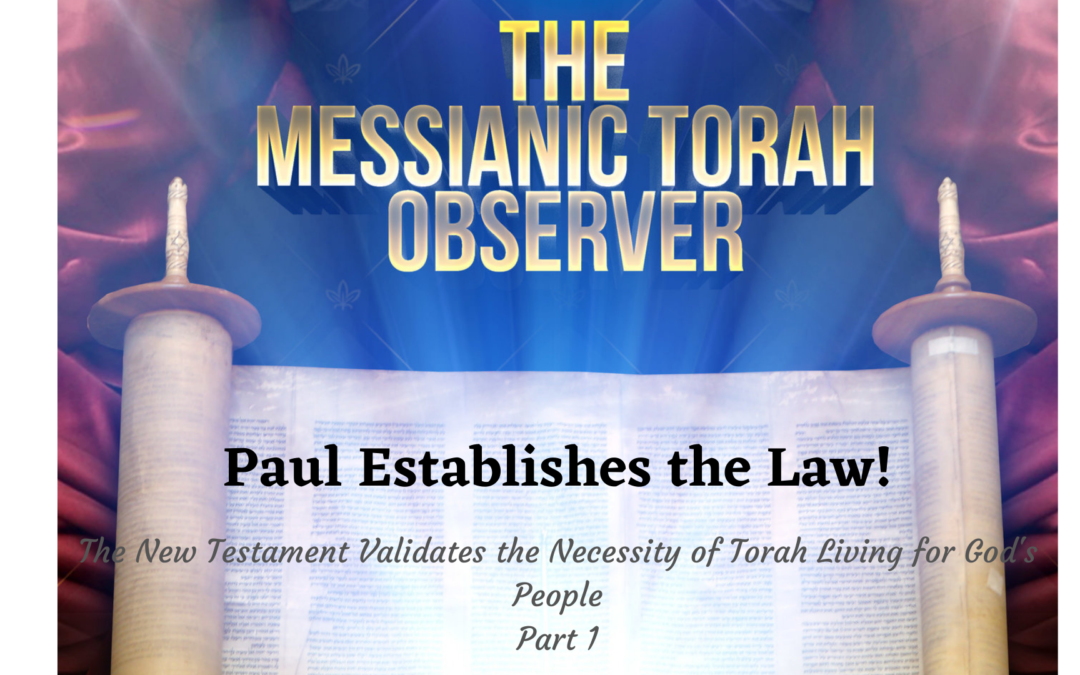
Paul Establishes the Law-Part 1 of the New Testament Validates the Necessity of Torah-Living for God’s People Series
In today’s discussion, we will attempt to define what the apostle means by “we establish Torah” in light of those seeming “anti-Torah” statements he makes in chapter 3 of the Book of Romans.
The Messianic Versus the World-Part 1-The Messianic Against the Corrupt and Evil Governments, Leaders and Sheeple of this World
The Messianic Versus a Corrupt World The governments of this world along with their leaders are openly evil and corrupt. They have brazenly shown that they have no shame in this regard. Many, in fact, have boasted of their evil and corrupt ways and intentions to...
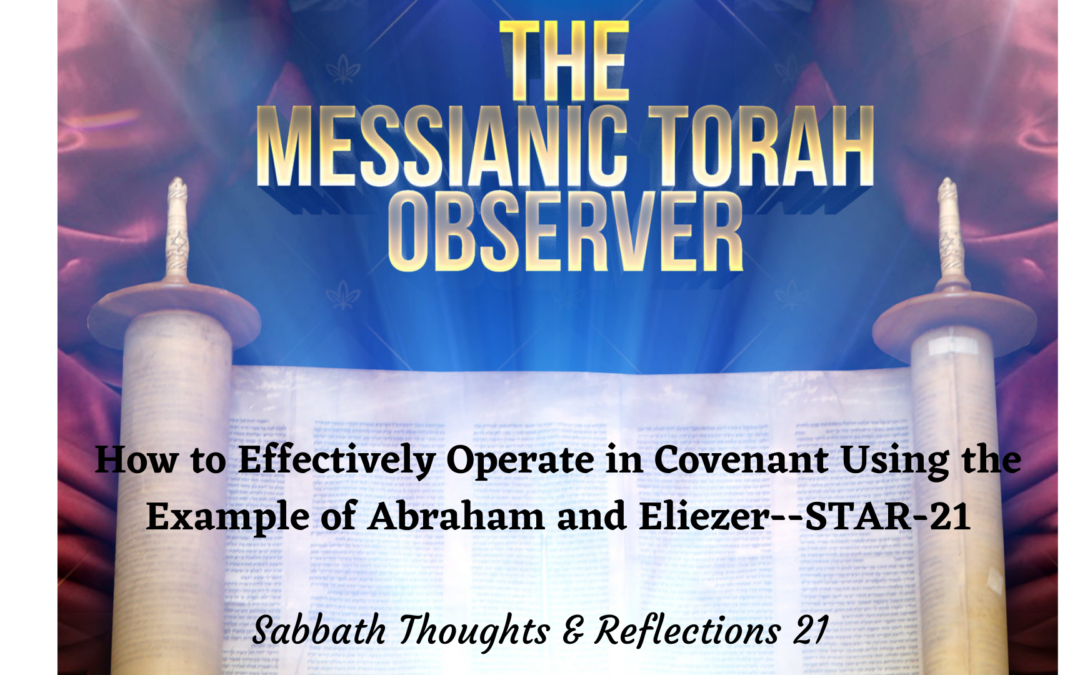
How to Effectively Operate in Covenant Using the Example of Abraham and Eliezer–STAR-21
We’ve talked quite a lot about be the importance of being in covenant and operating in covenant. But how does one operate in covenant? What is needed to operate in covenant. Well, this week’s Torah Reading may provide us the answers to these questions. Shabbat Shalom and Welcome.
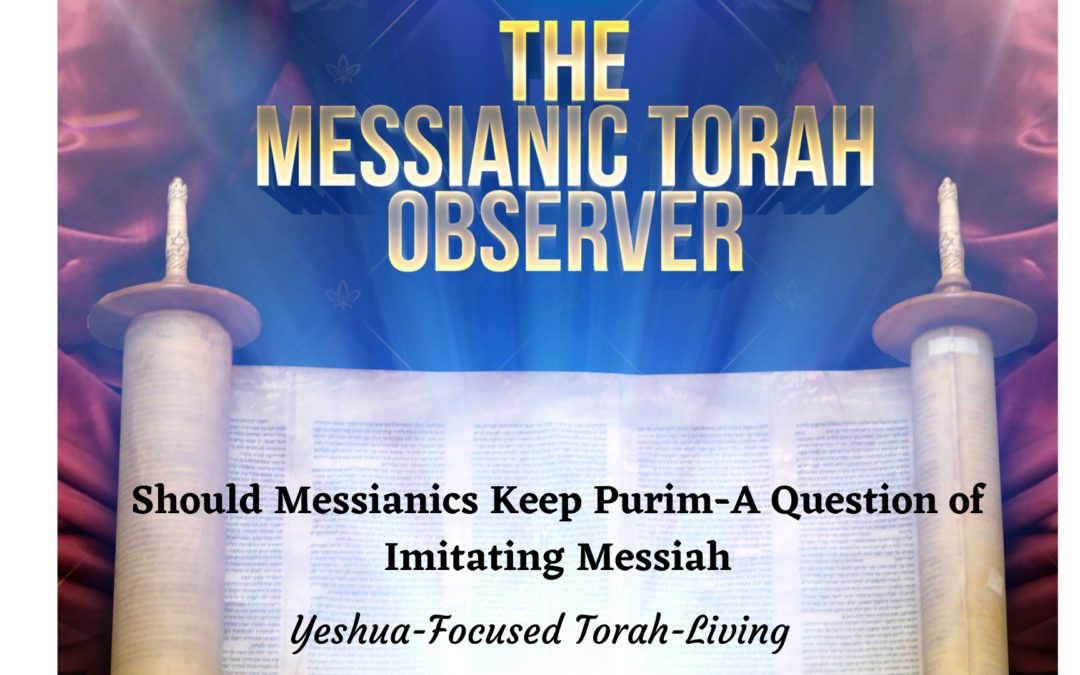
Should Messianics Keep Purim? A Question of Imitating Messiah
In this installment of TMTO, we ask and answer the question: Should Messianics keep-observe-honor-memorialize Purim? And in our brief exploration of this topic, we examine opposing views as it relates to Messianics and Purim.
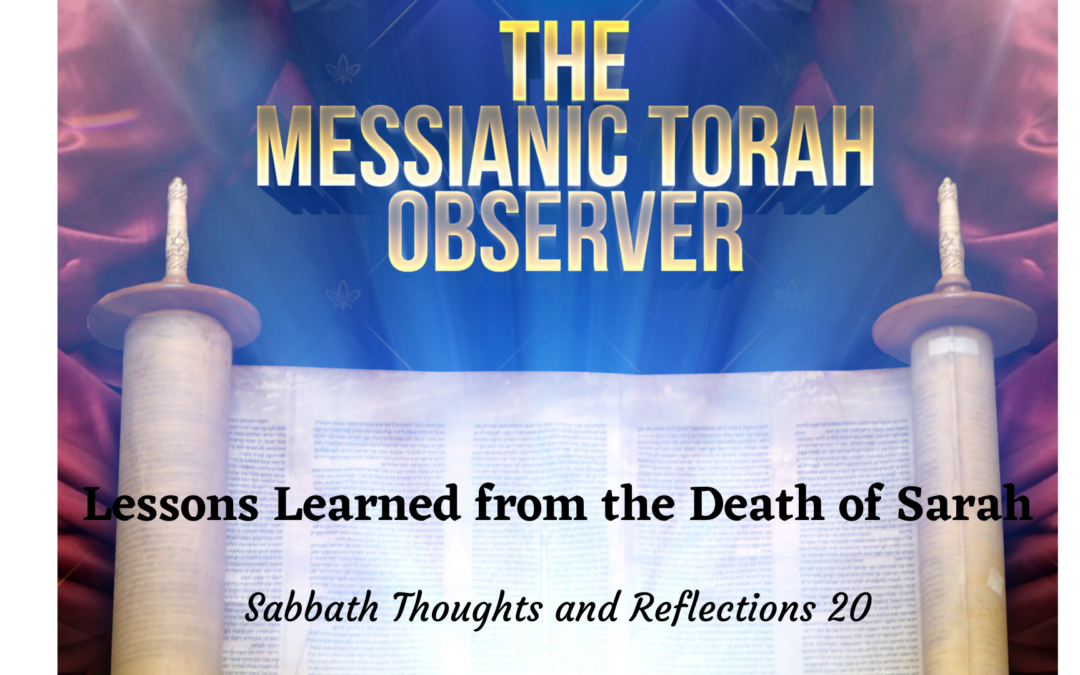
Lessons Learned from the Death of Sarah-STAR-20
In our Torah Reading for this Sabbath, we read of the death of the Matriarch of our Faith, Sarah. And in our discussion, we will explore the eternal truths associated with this sad, but important story. We will touch upon the themes of loving our wives; being a sojourner in this world; burial versus cremation when caring for a deceased loved one; as well as we’ll examine many of the historic and cultural elements that are attached to this beautiful Reading. Shalom and Welcome.
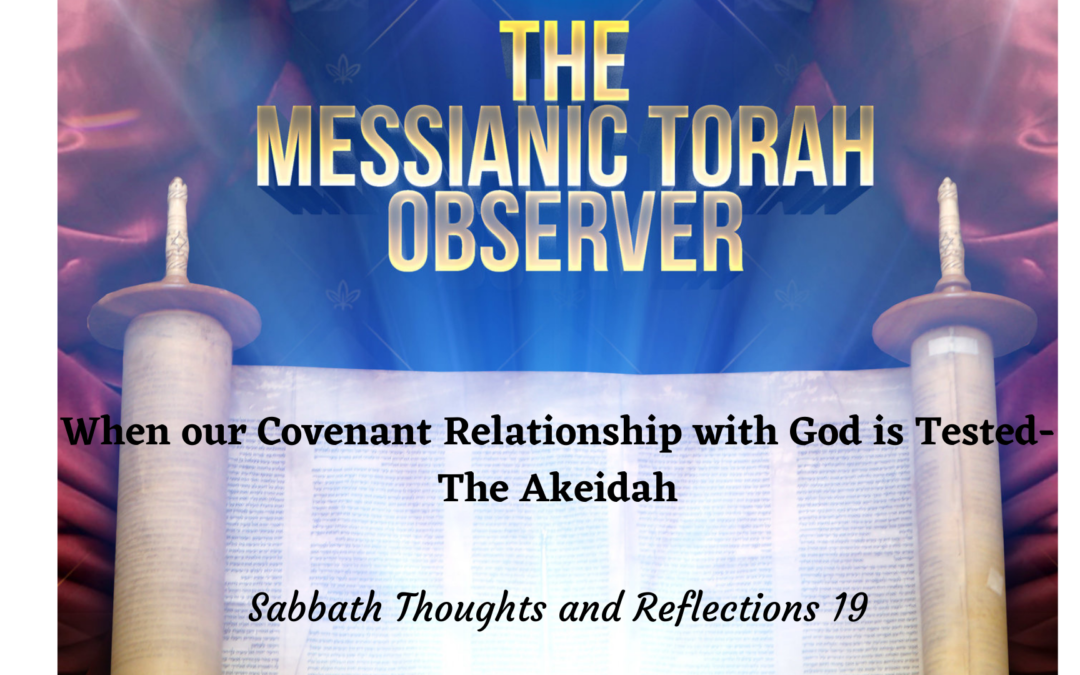
When our Covenant Relationship with God is Tested-Akeida-STAR-19
This week’s Torah Reading is that of the Akeidah or the binding of Isaac. It is a story about obedience, trusting faith and the ultimate goal of the Abrahamic Covenant. We will also explore the ramifications associated with God’s testing of those whom He loves. This is one of the most important Torah Reading Discussions of the Torah Reading Cycle. Come fellowship with us and let’s discuss the Eternal Mysteries of Yah’s Eternal Words of Life.
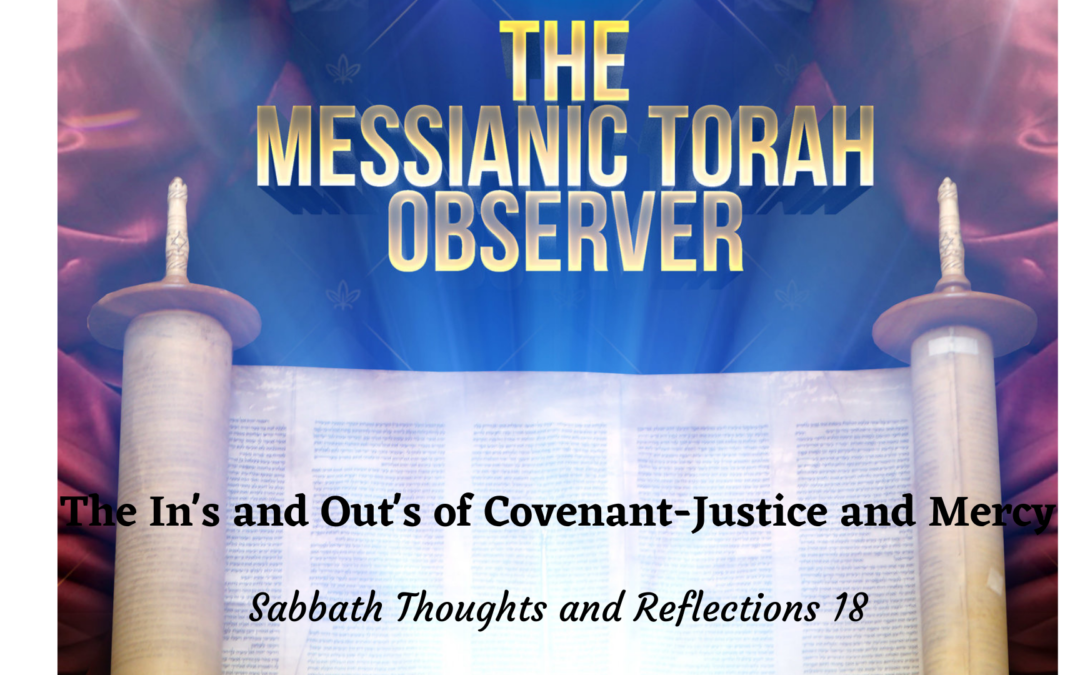
The In’s and Out’s of Covenant-Justice and Mercy-STAR-18
Many of us view covenant as an exclusive club or culture that belongs to God’s elect and those who find themselves outside of covenant are doomed to be outside of God’s blessings and provision. But the truth of the matter is that God operates in ways that are often foreign to us and that defy how we believe God should operate. In today’s Torah Reading discussion, we discuss the in’s and out’s of covenant and how God’s justice and mercy define how He will interact with those who are in covenant versus those who are outside covenant.
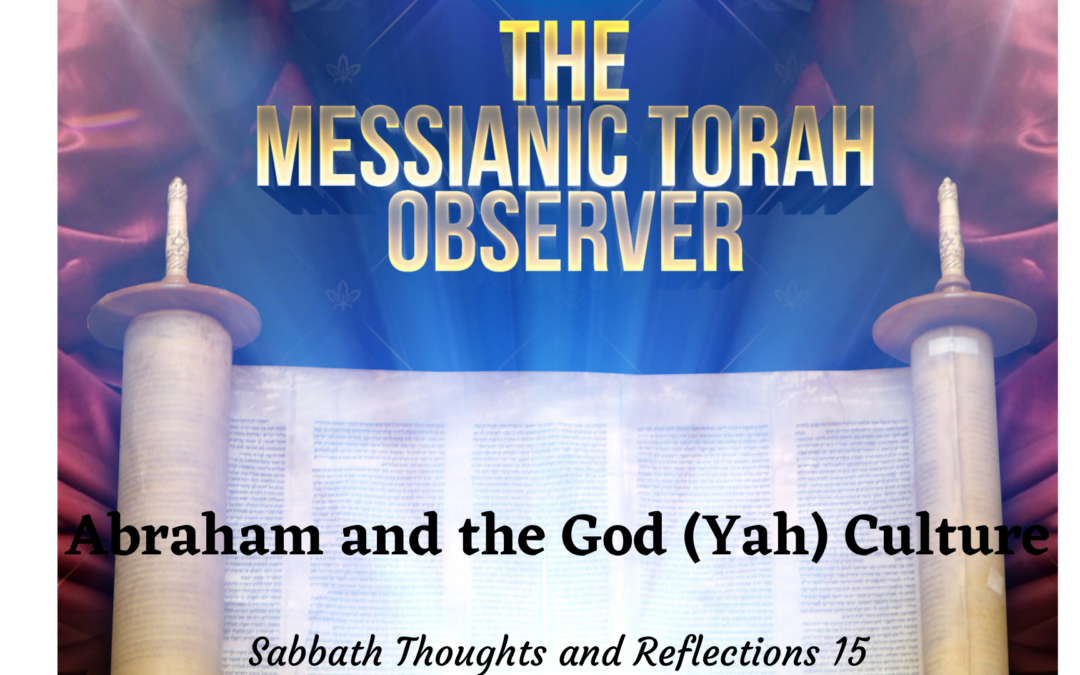
Abraham and the God (Yah) Culture–Sabbath Thoughts & Reflections 15
This week’s Torah Reading touches on a number of relevant themes that include righteousness, justice, reverence, hospitality, boldness, laughter, theophanies and covenant. But the one theme that stands out most is culture. In this installment of TMTO’s Sabbath Thoughts and Reflections, we explore each of these themes, in particular the theme of culture. What is the God Culture/the Hebrew Culture? What was Abraham’s role in that Culture? And what does that culture have to do with us today?
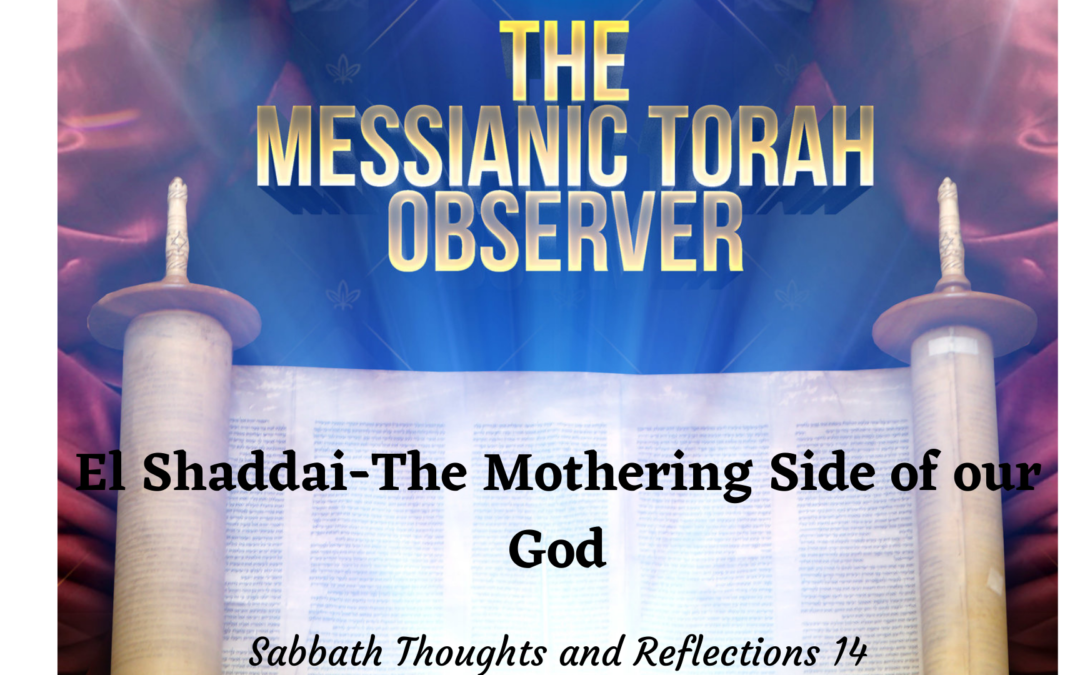
El Shaddai-The Mothering Side of our God-STAR 14
Seems we have been indoctrinated to view God exclusively from a “Fathering” perspective. But could one of God’s revealed names be indicative of a “Mothering” side to the Creator of the Universe? In this installment of TMTO we explore and discuss the power and meaning of El Shaddai.
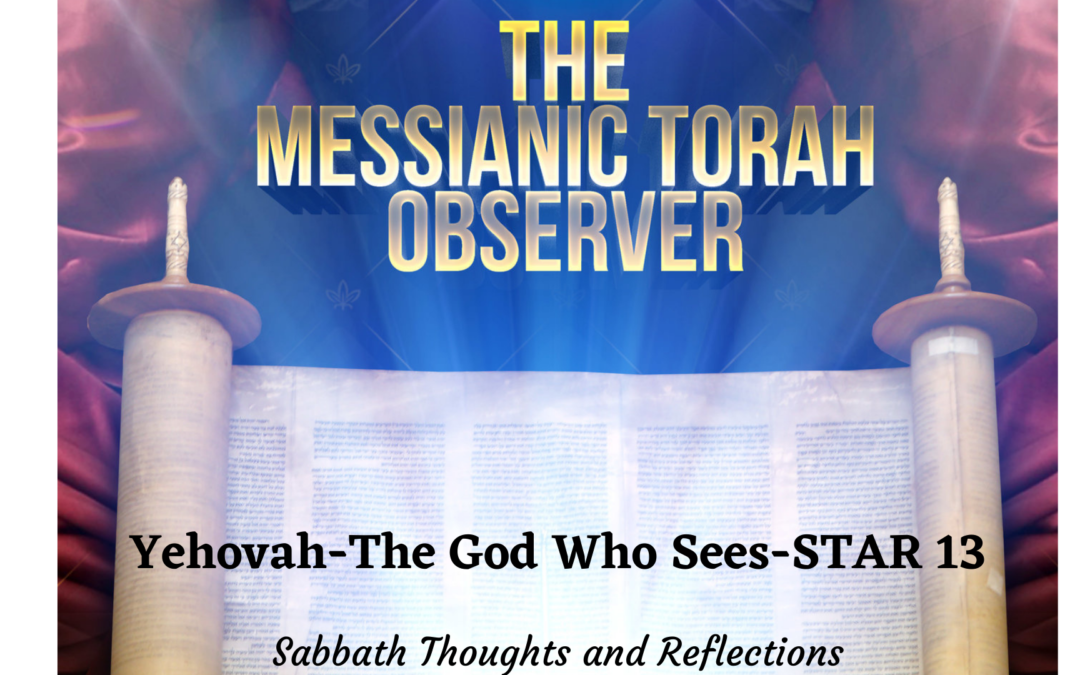
Yehovah-The God Who Sees-STAR 13
In our reading today, we’re led to think and reflect on the themes of:
● Trusting Faith
● Respect
● Patience & Perseverance
● Responsibility
● Honor
● The Spirit Realm Intersecting with the Physical Realm
● Promise
● Sonship
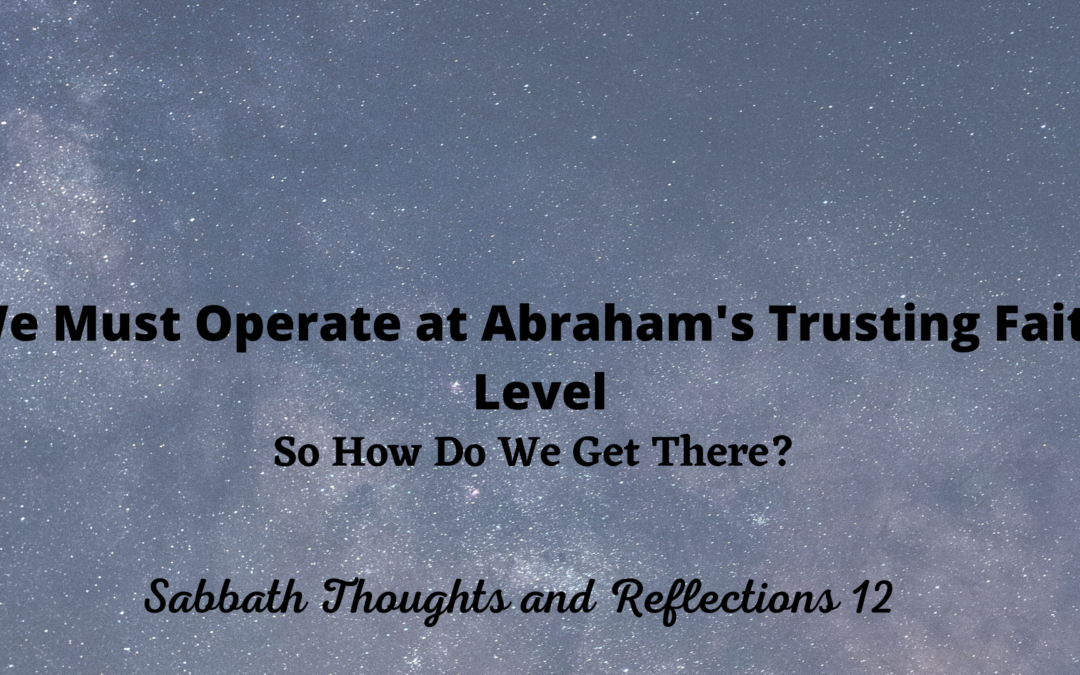
We Must Operate at Abraham’s Trusting Faith Level-So How Do We Get There? STAR 12
Today’s Torah Reading discussion will touch upon a great many themes that include operating in a trusting faith; the righteousness of Elohim; obedience to Yah’s instructions; divine protections and rewards; and the wisdom of challenging or questioning Yehovah.
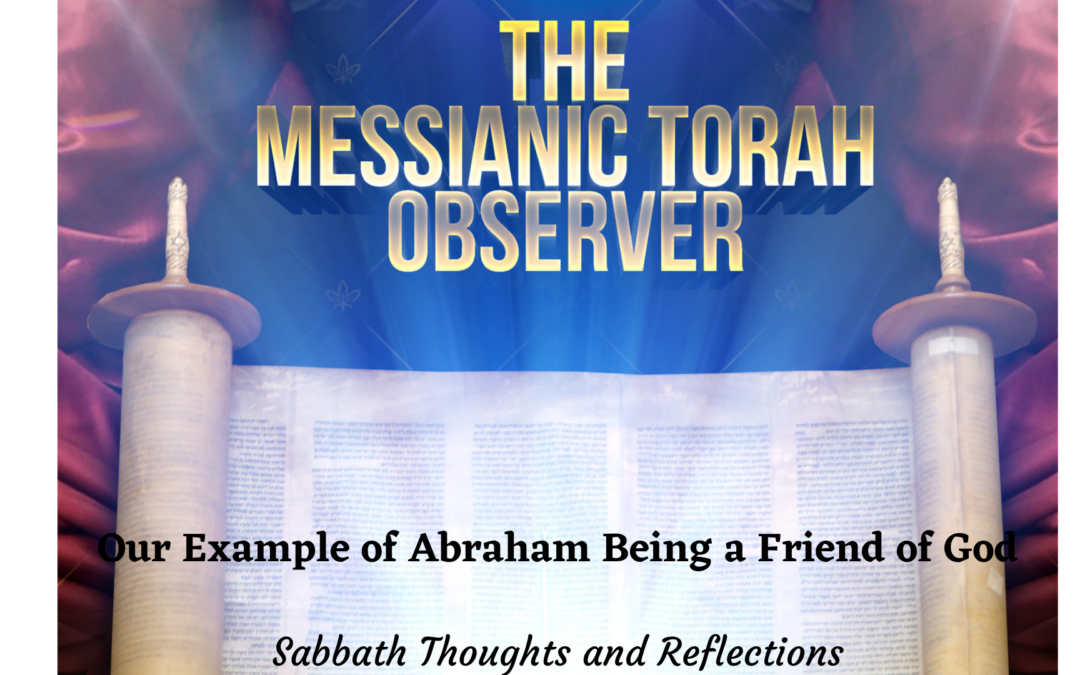
Our Example of Abraham Being a Friend of God-STAR-11
The circumcised heart of an individual—contrite and broken and humble in spirit—is the one thing that captures Yah’s attention and places him or her in contention for being chosen as His friend and ultimately His child. If our heart ain’t right, we ain’t going to be chosen to enter into an obedient covenant relationship with Yehovah, much less a friend or child of His.
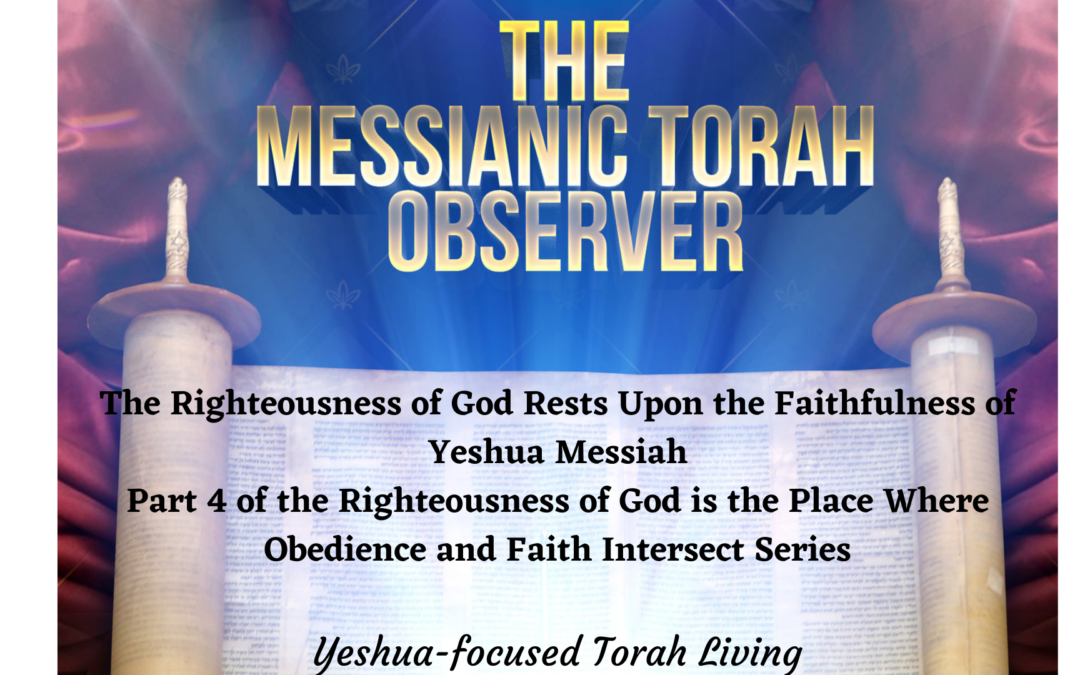
The Righteousness of God Rests Upon the Faithfulness of Yeshua Messiah
Indeed, the Righteousness of God is the place where faith and obedience come together through the Person and Ministry of Yahoshua Messiah. His faithful obedience to Yehovah becomes our faithful obedience, even unto death.
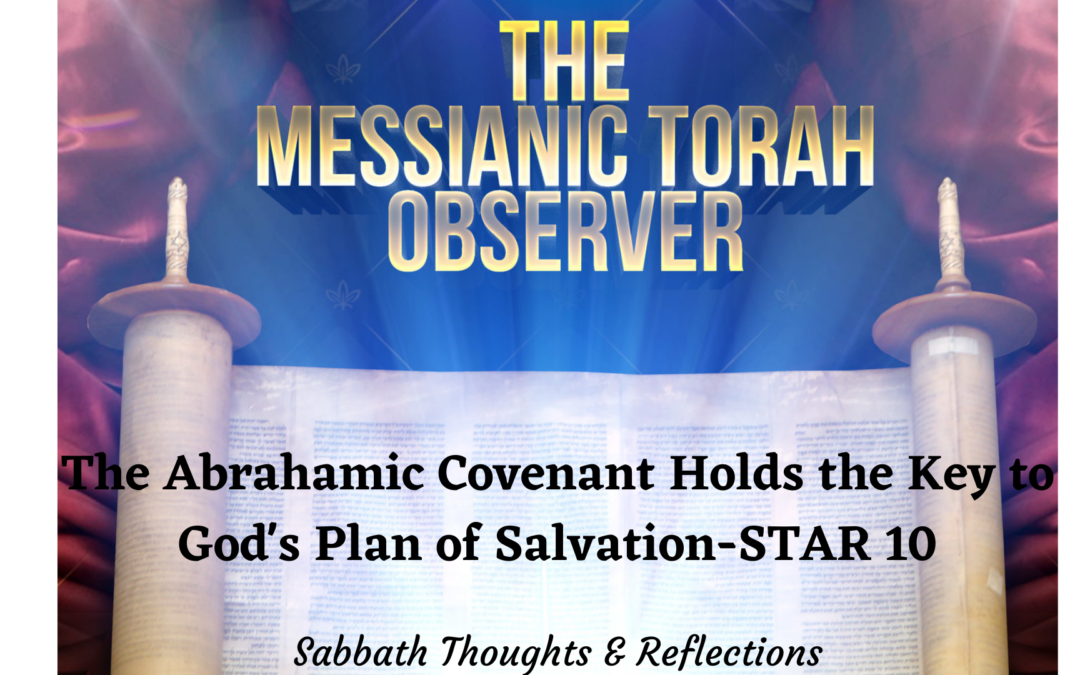
The Abrahamic Covenant Holds the Key to God’s Plan of Salvation-STAR 10
The Abrahamic Covenant is the essential element of this week’s Torah Reading. We find in our discussion that the Abrahamic Covenant holds the key to God’s Plan of Salvation. Shabbat Shalom.
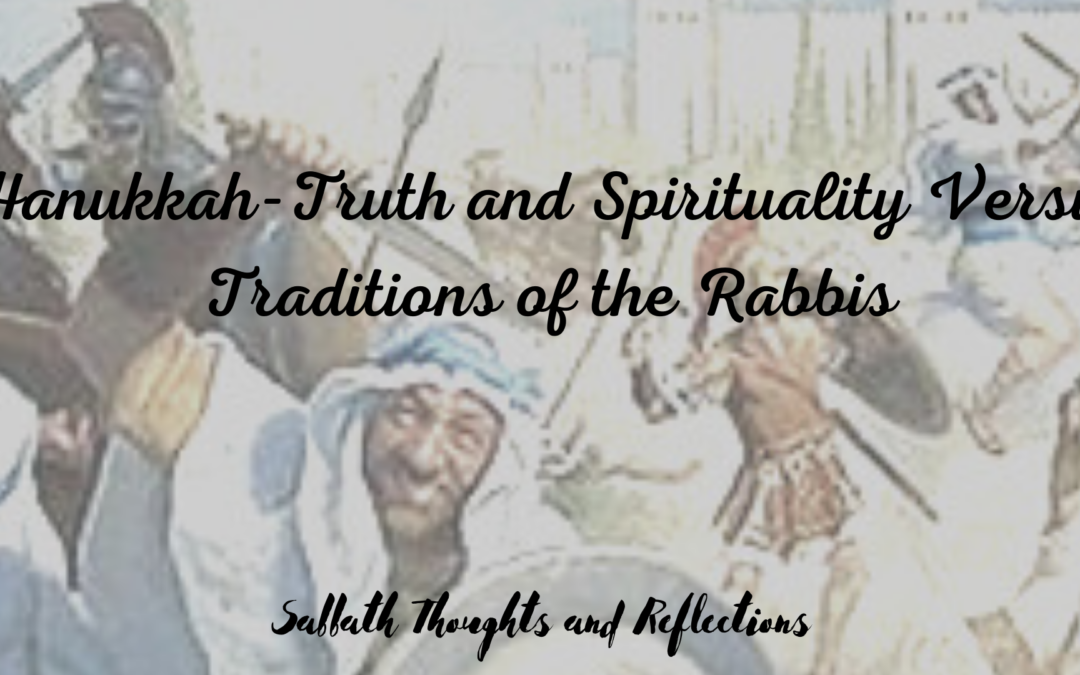
Hanukkah-Truth and Spirituality Versus Traditions of the Rabbis
Many within our Faith Community will be celebrating Hanukkah this week. But is their celebration aligned with the Truth and Spiritual Reality of the Holiday or rather on the Traditions that revolve around it.
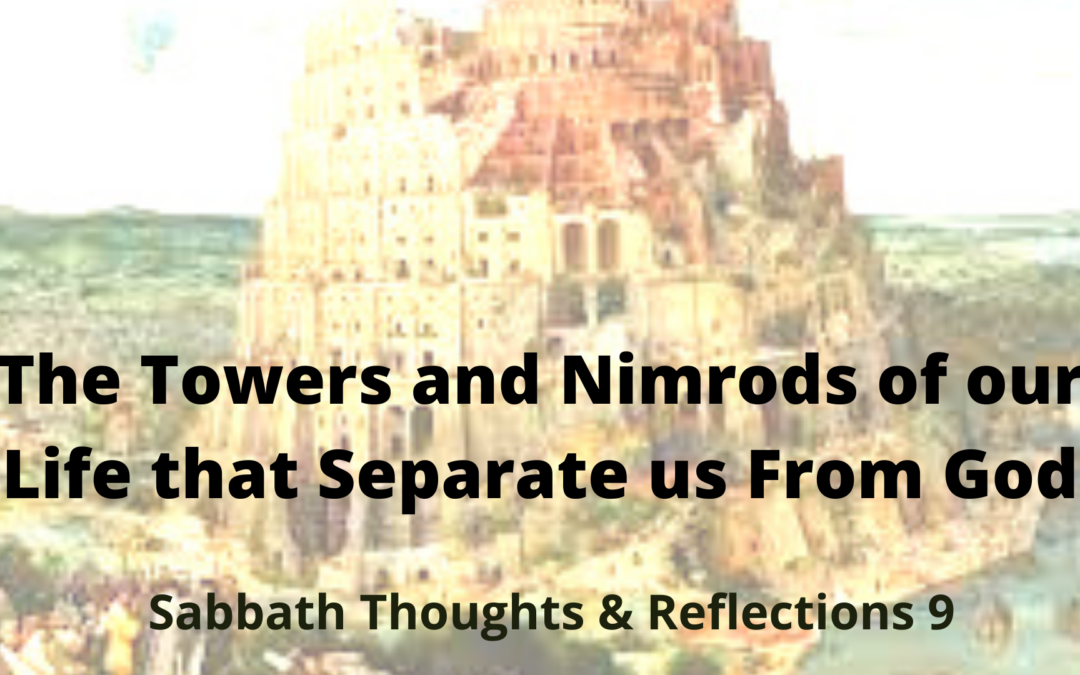
The Towers and Nimrods of our Life that Separate us From God
This week’s Torah Reading is based upon the Tower of Babel story. This story may cause us to reflect and think about those towers in our lives that cause us to be separated from God.
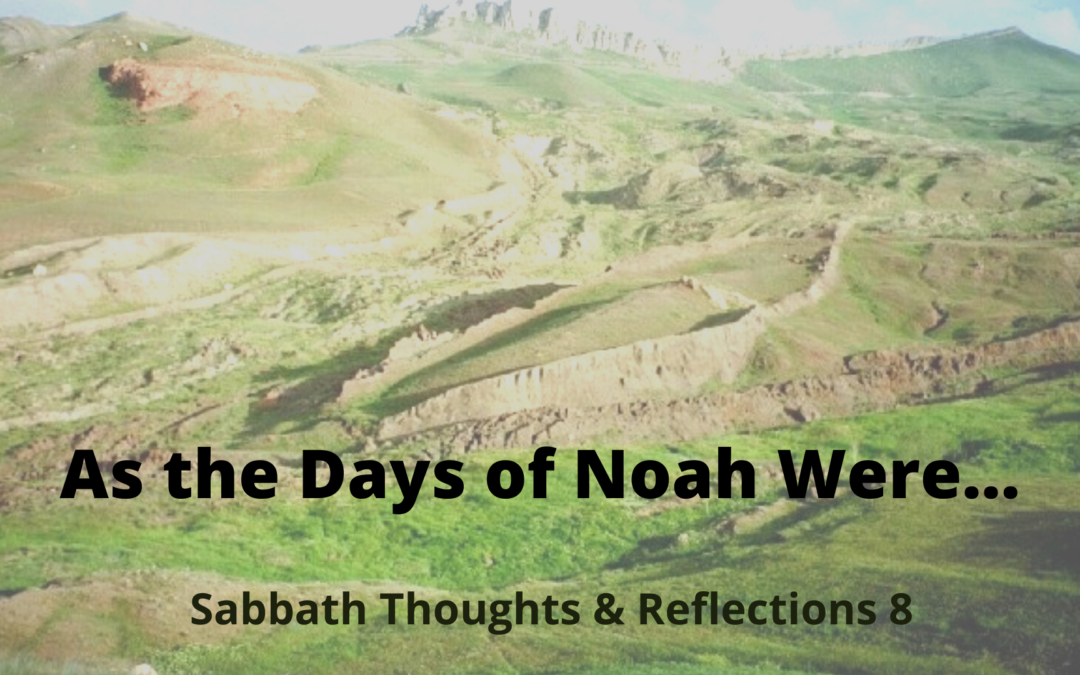
As the Days of Noah Were…Sabbath Thoughts and Reflections 8
What are the implications for us of Yeshua’s prophecy that the world He would return to would be as the days of Noah were? We discuss, think and reflect. Shabbat Shalom.
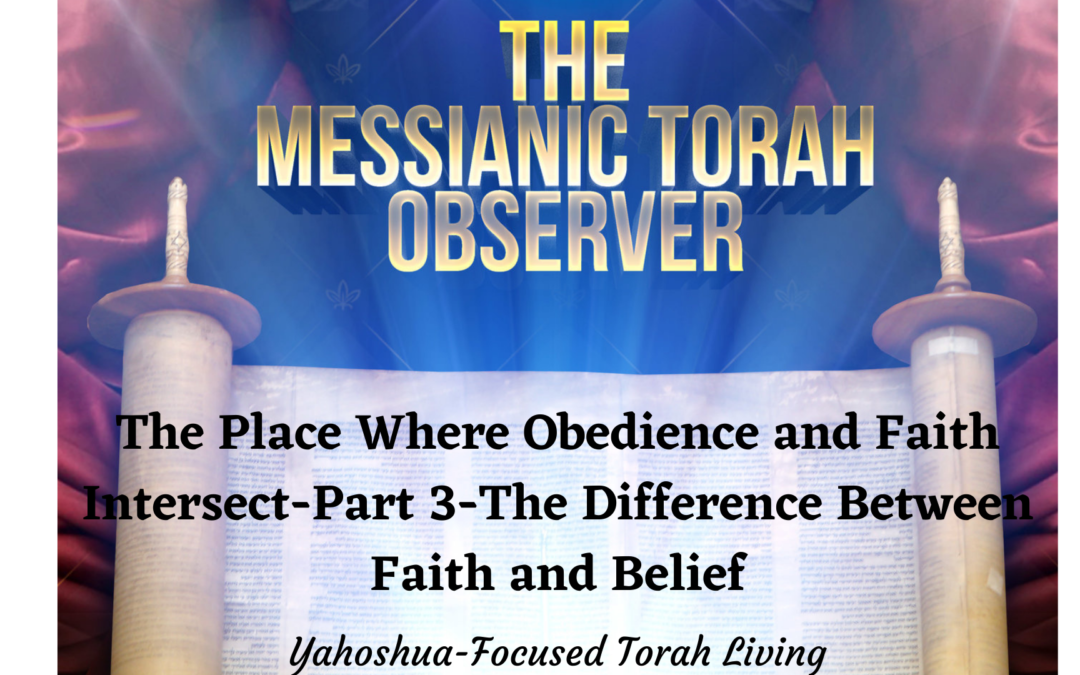
The Difference Between Faith and Belief-The Righteousness of God is the Place Where Obedience and Faith Intersect-Part 3
In our continuing exploration of Shaul’s teaching on the Righteousness of God, we answer the critical question: Is there a difference between biblical “faith” and “belief? Both terms are mentioned as important elements to our receiving of God’s Righteousness.
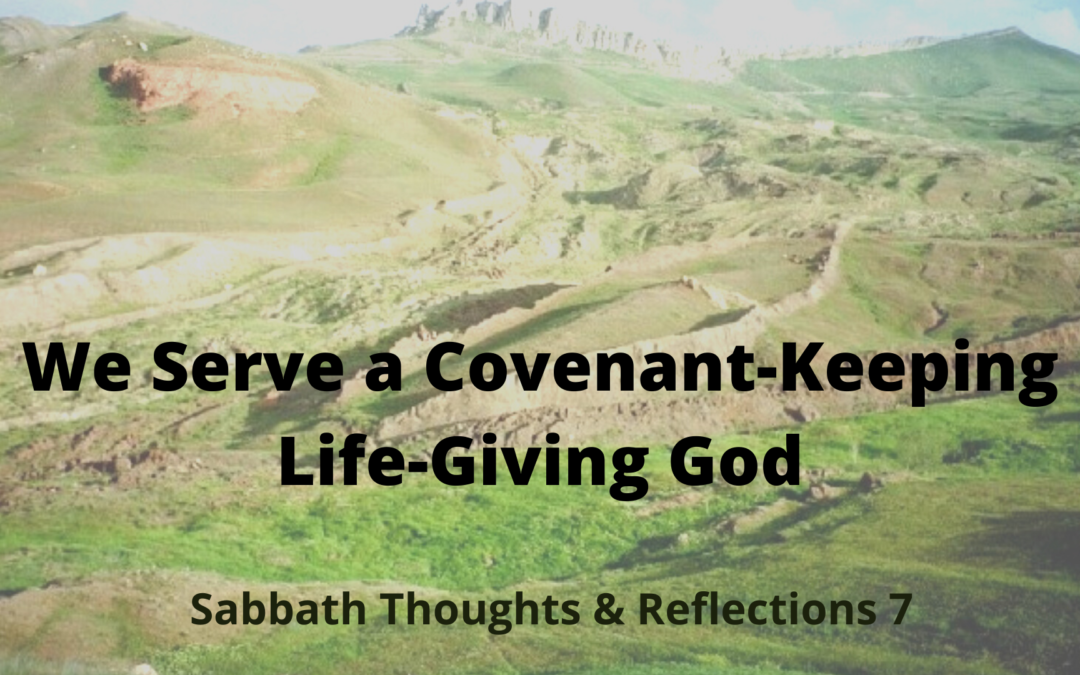
We Serve a Covenant-Keeping Life-Giving God-STAR-7
In this week’s Torah Reading, we discuss the Truth about the Noahide Laws; the true significance of the rainbow; and the character of God that promotes life and covenant among humanity. Come study and fellowship with us. Shabbat Shalom.

And God Remembered Noah-Sabbath Thoughts & Reflections 6
This week’s Torah Reading is the story of the saving of Noah and his family brought about through God keeping covenant and manifesting His righteousness. Come study with us. Shabbat Shalom.
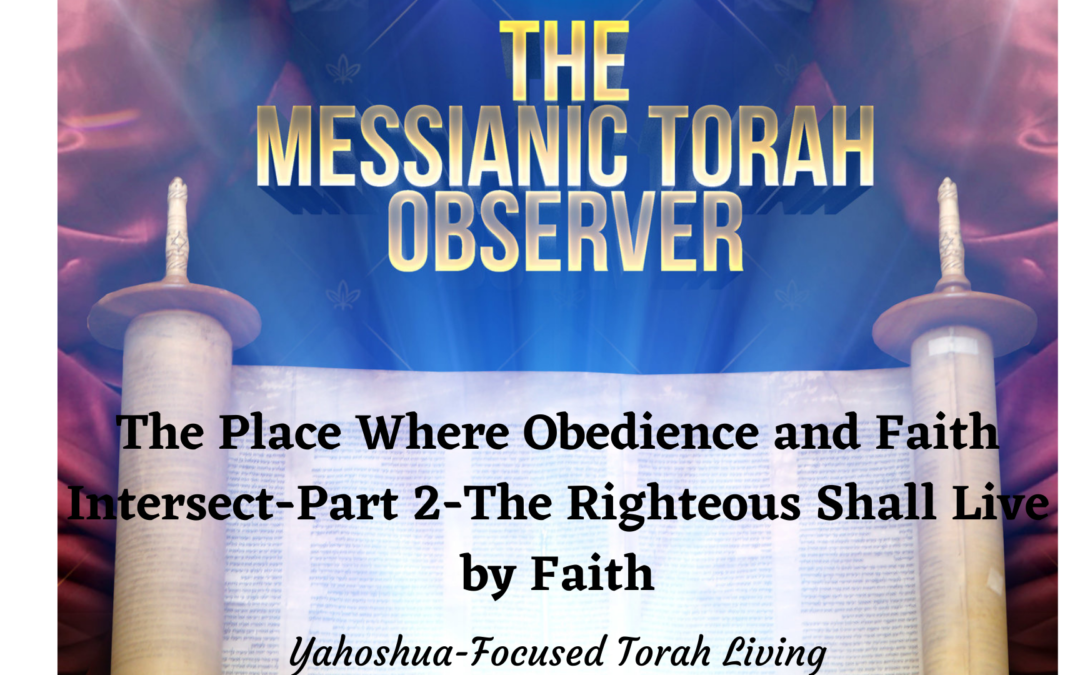
The Righteousness of God is the Place Where Obedience and Faith Intersect-Part 2-The Righteous Shall Live By Faith
Paul declared to the Romans that the just shall live by faith. What exactly did he mean by that statement, especially as it relates to our walk in Messiah? We discuss
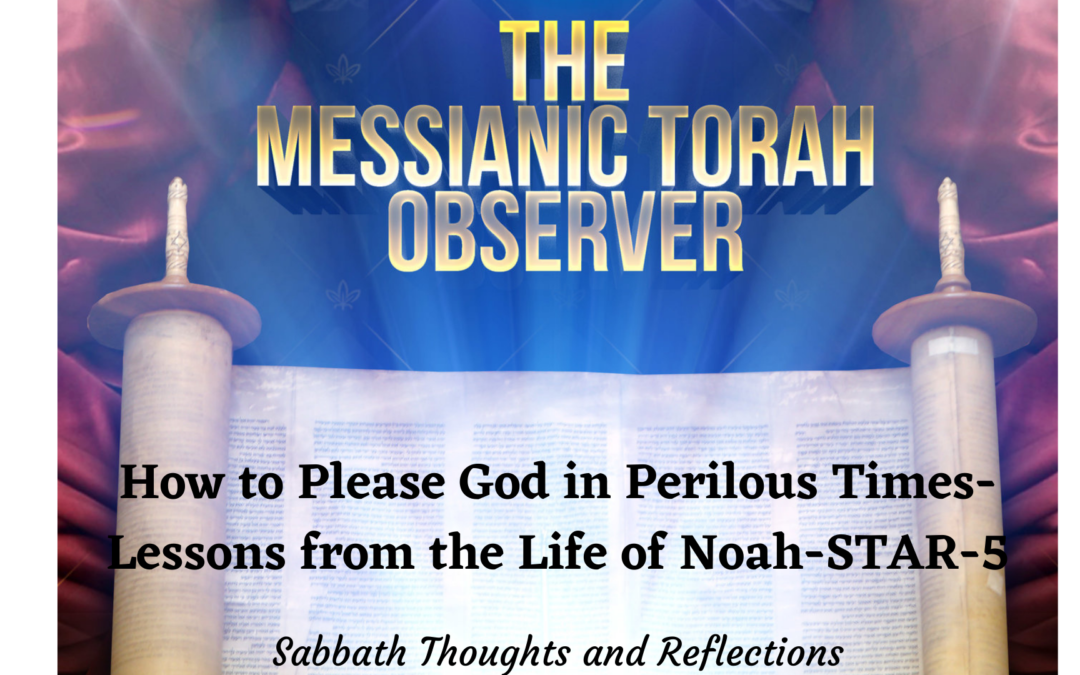
How to Please God in Perilous Times-Lessons from the Life of Noah-STAR-5
Noah pleased God in one of the most wicked periods of human history. What was it about Noah that pleased God? His story is the key to our pleasing God in these perilous times and we discuss in this installment of TMTO STAR.
Forbidden Messianic Titles and Roles for the Body of Messiah
This is "Forbidden Messianic Titles and Roles for the Body of Messiah." And this discussion is within the purview of the central theme for this ministry: "Yeshua-focused Torah Living." We are all about promoting the Netzari Faith that was once delivered to the...
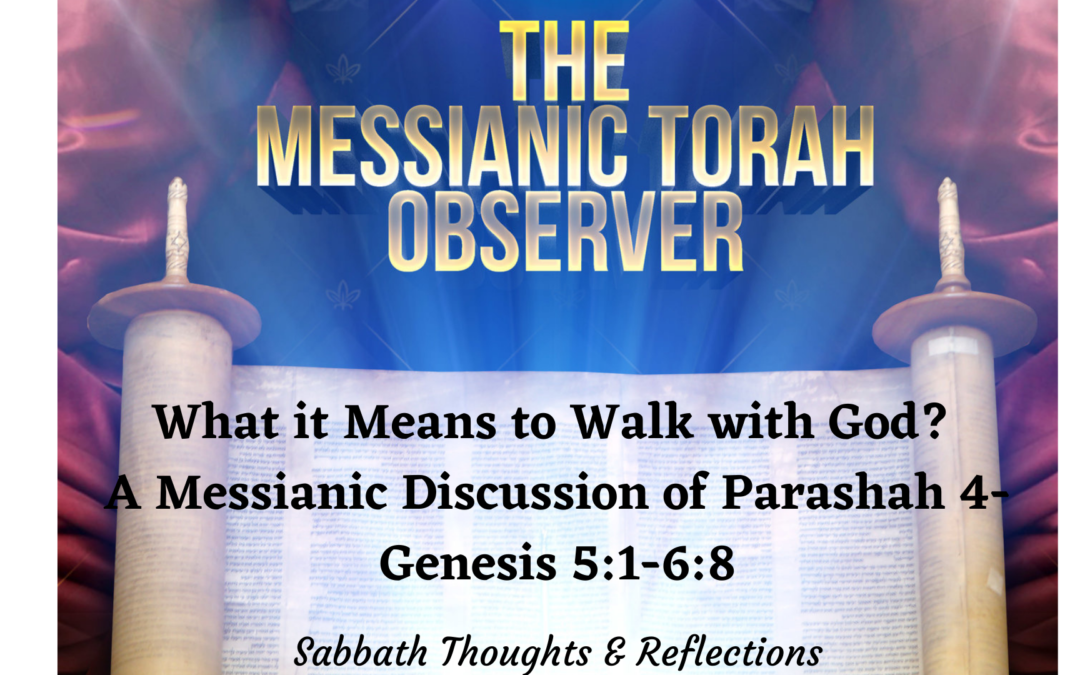
What it Means to Walk with God? STAR-4
Today’s discussion is entitled: “What it Means to Walk with God;” it is a Messianic Discussion of the 4th Parashah in the 3-year Torah Reading Cycle. Our discussion text for this Shabbat will be Genesis 5:1-6:8. I will be reading and commenting from the...
The Righteousness of God is the Place Where Obedience and Faith Intersect-Part 1-What is the Righteousness of God?
This is “The Righteousness of God is the Place Where Obedience and Faith Intersect—Part 1—What is the Righteousness of God?” Pose the Central Questions Inevitably, the central question facing Messianics is how does one balance a life of Torah-honoring with that of...
The Heart of True Worship-STAR-3-A Messianic Discussion of Genesis 4:1-26
Today’s discussion is entitled: “The Very Heart of True Worship;” it is a Messianic Discussion of the 3rd Parashah in the 3-year Torah Reading Cycle. Our discussion text for this Shabbat will be Genesis 4:1-26. I will be reading and commenting from the...
Who is to Blame for the Sin of the World? Adam or Eve?” STAR-2-A Discussion of Genesis 2:4-3:24
INTRODUCTION This is Sabbath Thoughts and Reflections 2—A Discussion of Genesis 2:4-3:24—Parashah 2 in our 3-year Torah Reading Cycle. Since the rabbis did not have a hand in naming the individual Torah Readings in the 3-year Reading Cycles, for the sake of reference,...
The Call to True Biblical Repentance is to Teshuva
A Question of Kingdom Preparedness This was a teaching I delivered to a Sabbath-keeping group online this past Sukkot. I've entitled it "The Call to True Biblical Repentance is to Teshuva." This teaching is actually the firstfruits, if you will, of an overall...
Made in the Image of God-Sabbath Thoughts & Reflections on Genesis 1:1-2:3
"In the beginning Yehovah created..." appears to be a subordinate or supportive statement as opposed to an independent clause. Assuming subordinate/supportive is accurate, the clause is better rendered: "When Yehovah began to create the heavens and the earth..."...
[If] The Law Does Not Save—[Then] What Good Is It–A Messianic Discussion of Romans 3:9-20
Goal Today’s installment of The Messianic Torah Observer is entitled: “[If] The Law Does Not Save—[Then] What Good Is It--A Messianic Discussion of Romans 3:9-20.” Our goal for today’s discussion is to draw from the Apostle Paul’s letter to the first-century Roman...
What Right Does God Have to Punish Anyone? A Messianic Discussion of Romans 3:5-8
Goal: This is a continuation and an expansion of the diatribe the apostle began back in the second half of the second chapter of Romans which I’ve entitled: “What Right Does God Have to Punish Anyone—A Messianic Discussion of Romans 3:5-8.” And our goal for this...
Let God Be True and Every Man a Liar–A Messianic Discussion of Romans 3:3-4
Goal: This is “Let God Be True and Every Man a Liar—A Messianic Discussion of Romans 3:3-4.” It will be a resumption of our examination and discussion of Romans chapter three (3), picking up where we left off from the last installment of our overarching Paul and...
The Oracles of God-The Jewish Advantage-A Messianic Discussion of Romans 3:1-2
The Oracles of God-The Jewish Advantage-A Discussion of Romans 3:1-2 Today’s discussion is entitled: “The Oracles of God—The Jewish Advantage--A Discussion of Romans 3:1-2. This will be a continuation of our long-running Paul and Hebrew Roots Series. Looking...
Paul on Physical Circumcision-A Question of One’s Jewishness Part 4
In today's post we answer the questions: Is physical circumcision still a valid commandment for men of faith to keep and obey? What advantage is there to physical circumcision? Synopsis of the Preceding Installments to the Series Over the course of the last three...
Marriage and Divorce According to Torah Part 2–A Discussion of Parashah 144
Marriage and Divorce According to Torah Part 2—A Discussion of Parashah 144 This is the second post or second half of the overall discussion I have for you regarding this week’s Torah Reading of Deuteronomy 24:1-4. In this post we will cover the teachings of Y’shua...
Marriage and Divorce According to Torah Part 1–A Discussion of Parashah 144
Marriage and Divorce According to Torah Part 1—A Discussion of Parashah 144 Although our Torah Reading for today, Parashah 144, covers Deuteronomy 24:1–25:19, I was led by the content to focus only on the first four-verses of the entire reading. The focus of these...
What Loving One Another Looks Like–The Morality and Love of Torah-Parashah 143
What Loving One Another Looks Like--The Morality and Love of Torah-Parashah 143—Sabbath Thoughts and Reflections Our Torah Reading This Week—Parashah 143—Is Found in Deuteronomy 22:8-23:25 The physical should always be followed when applicable, but also the...
What is the True State of our Worship?–Parashah 139 Discussion and Study
What is the True State of our Worship?--Parashah 139 Discussion and Study In today’s installment we will be discussing Parashah 139—which is contained in Deuteronomy 17:1-20. So grab your bible and maybe a cup of coffee or tea, and let’s get into our study of Yah’s...
A Sit-Down Conversation with Dr. Miles R. Jones on the Survival of the Hebrew Gospels
Greek Primacy vs. Hebrew We have been indoctrinated and taught that the original Gospel texts of Matthew, Mark, Luke, John, Acts and Revelation were all written in ancient Greek. But is this in fact true? For one must rationalize that the writers of these texts were...
Round and Round the Asherah Pole We Go–Parashah 138
This Week’s Torah Reading This week’s Torah Reading, Parashah 138, is contained in Deuteronomy 16:13-22. My ruach eye (that is, my spirit eye) seemed focused primarily on Deuteronomy 16:21-22. These two verses has to do with, yet again, another admonishment to avoid...
Paul on Physical Circumcision for God’s People–A Question of One’s Jewishness Part 3
Opening Remarks on Paul on the Question of Physical Circumcision for God’s People In this installment of the Messianic Torah Observer, we return to our Paul and Hebrew Roots Series and to our series within a series entitled: “A Question of One’s Jewishness.” Today,...
God’s Food Laws-Tithing-Walking in Obedient Covenant Relationship with God-Parashah 136
This Week’s Torah Reading is found in Deuteronomy 12:20-15:6. I’ve entitled this discussion: Gods Food Laws-Tithing-Walking in Obedient Covenant Relationship with God-Parashah 136 Personal Perspective—Opening Remarks Our obedient covenant relationship with the...
Racism and Faith–What Walking in Torah With a Circumcised Heart Looks Like—Parashah 134
How Yah views race and skin color This past week’s interaction with Faith and Race. Not a direct interaction, but an interaction that directly affected friends of this ministry. And these friends ended up having a very troubling experience with a member a black...
Humility-Pride-Remembering-God’s Grace and God’s Faithfulness—Parashah 133
Our Torah Reading: Deuteronomy 9:1-29—Humility-Pride-Remembering-God’s Grace and Faithfulness—Parashah 133 Father’s Faithfulness Stands Despite Our Debased Nature How are we to understand Father’s faithfulness towards us despite our incessant propensity to...
Who and What is Yeshua Messiah-My Personal Perspective on the Person of Yeshua Messiah
Recently, a dear sister discovered this ministry through our website, www.themessianictorahobserver.org. She reached out to me via a couple email messages. And she posed the question: Who or what I believe Yeshua Messiah to be? And she prefaced her question by...
Yeshua-The Bread of Life-Torah Reading-132
Introduction to Parashah 132—Yeshua, the Bread of Life Our Parshah this week, under the 3-year Torah Reading cycle, is found in Deuteronomy 8:1-20. The most prominent verse in the reading is verse 3: “Thou shalt not live by bread alone, but by every Word that...
Blaspheming the Name of God-Part-2 of the Series A Question of One’s Jewishness
Picking-Up Where We Left Off What I want to do this week is to pick-up from where we left off from the last installment of this series within a series which was entitled: "You Are Called a Jew" and move on through verses 19 through 24 in this installment. And...
The Shema-God’s Word Dwelling Within Us-Sabbath Thoughts & Reflections-Parashah 131
Today's Torah Reading Shabbat Shalom beloved of the Most High and sister and brother of the true Faith once delivered. Today's Torah Reading or Parshah is found in Deuteronomy 6:4-7:26; Zechariah 14:1-9; and Mark 12:28-34. But given the content rich nature of this...
Hear O Israel The Statutes and Ordinances Which I Speak-Thoughts and Reflections on Parashah 130-Deuteronomy 5:1-6:3
What Yehovah Expects of His Children This week's Torah Reading (aka parshah), found in Deuteronomy 5:1-6:3, is a reiteration of the 10-Commandments by Moshe to the generation slated to enter the Land of Promise. And along with that iteration comes clarification as to...
Heeding Zophar’s Wisdom About Yehovah
Job: A Story With Many Complexities You know, the story of Job is not by any stretch of the imagination an easy one to work through. Theres just so many complex literary and spiritual textures and concepts woven into the baseline story. The Cepher of Job is in part a...
Can I Get a Witness Up In Here?
A Story of Witness and Commitment to YHVH Picking up from my last blog-post taken from the Cepher of Y’hoshua (aka Joshua), I wish to now turn our attention to chapter 22, verses 10-34. And what we find here in this passage of Holy Writ is an amazing but awesome...
The Great Commitment to Kingdom Living by God’s Elect
My daily Torah studies this morning brought me to the Cepher of Y'hoshua (aka Joshua), chapter 22. By the end of my studies this morning, I was compelled to ask myself, what is the level of commitment I had to walking and living Kingdom. You'll soon see what I mean....
You Are Called a Jew-Part 1 of the Series: A Question of One’s Jewishness
Goal Today we continue our exposition into some of the Apostle Paul's most challenging and hard to understand writings and teachings, having just concluded in our previous post a discussion on the apostle's naming the "gospel" as "my gospel." (I would humbly...
The Gospel According to the Apostle Paul
Our New Challenging Pauline Passage--Romans 2:16--A Seemingly Bold and Curt Statement From the Apostle. Our focus passage, or more precisely, our focus verse today is Romans 2:16. And we find when we read this verse a rather bold and seemingly curt statement...
Are You Under the Law? Part 4 of the Paul on Being Under the Law Series
A Culmination of the Previous 3-Installments Today's discussion is a culmination of the previous 3-installments of this series within a series where we'll finally answer the question: What did Paul mean by one who is under the Law as mentioned in Romans 6:14-15. And...
Paul on Being Under the Law Part 3–Keeping Passover 2021 and Sin Consciousness
1 Corinthians 5:7-Get rid of the old hametz, so that you can be a new batch of dough, because in reality you are unleavened. For our Pesach lamb, the Messiah, has been sacrificed (CJB). Yeshua is our Pesach How appropriate for this time of year wouldn't you say. And...
Paul on Being Under the Law-Part 2-Torah Meets Grace
Goal What I would like to do in today's installment of TMTO is to lay the ground-work or set-the table if you will in our gaining as complete an understanding of what the Apostle Shaul (aka the Apostle Paul) meant when he wrote to his Roman Messianic readers that "sin...
Torah Readings and Studies-Deuteronomy 13–Beware of False Prophets
Prophets That Enticed Departure From Covenant A most timely Torah Reading this past Sabbath I must say: Deuteronomy 13:1-5, which addressed the issue of false prophets amongst Yah's set-apart people. This mitzvah (or commandment) was not so much against those who...

0 Comments